Lesson 2(1)
Unit 2 Lesson 2 (教案)-高中英语北师大版(2019)选择性必修第一册
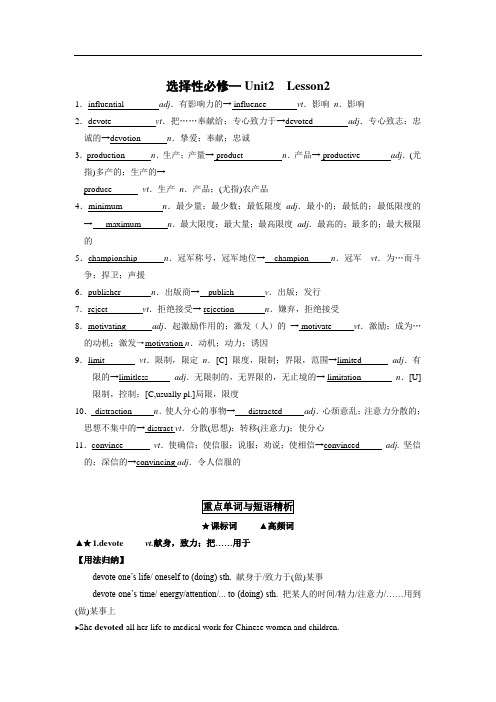
选择性必修一Unit2 Lesson21.influential adj.有影响力的→ influence vt.影响n.影响2.devote vt.把……奉献给;专心致力于→devoted adj.专心致志;忠诚的→devotion n.挚爱;奉献;忠诚3.production n.生产;产量→ product n.产品→ productive adj.(尤指)多产的;生产的→produce vt.生产n.产品;(尤指)农产品4.minimum n.最少量;最少数;最低限度adj.最小的;最低的;最低限度的→maximum n.最大限度;最大量;最高限度adj.最高的;最多的;最大极限的5.championship n.冠军称号,冠军地位→champion n.冠军vt.为…而斗争;捍卫;声援6.publisher n.出版商→publish v.出版;发行7.reject vt.拒绝接受→ rejection n.嫌弃,拒绝接受8.motivating adj.起激励作用的;激发(人)的→ motivate vt.激励;成为…的动机;激发→motivation n.动机;动力;诱因9.limit vt.限制,限定n.[C] 限度,限制;界限,范围→limited adj.有限的→limitless adj.无限制的,无界限的,无止境的→ limitation n.[U]限制,控制;[C,usually pl.]局限,限度10.distraction n.使人分心的事物→distracted adj.心烦意乱;注意力分散的;思想不集中的→ distract vt.分散(思想);转移(注意力);使分心11.convince vt.使确信;使信服;说服;劝说;使相信→convinced adj. 坚信的;深信的→convincing adj.令人信服的★课标词▲高频词▲★1.devote vt.献身,致力;把……用于【用法归纳】devote one’s life/ oneself to (doing) sth. 献身于/致力于(做)某事devote one’s time/ energy/attention/... to (doing) sth. 把某人的时间/精力/注意力/……用到(做)某事上▶She devoted all her life to medical work for Chinese women and children.她把一生都奉献给了中国妇女和儿童的医疗工作。
新概念英语第一册 Lesson2 讲义

倒背如流新概念一上Unit2 Sorry,sir【Word】umbrella n. 伞please int. 请here adv. 这里my 我的ticket n. 票number n. 号码five num 五sorry adj 对不起的sir n. 先生cloakroom n. 衣帽间★here adv.这里地点副词:(在英语中,时间副词、地点副词的前面不能加介词)here 这里there 那儿home 家(副词,名词)★five num.五one,two,three,four,five,sir,seven,eight,nine,ten★sir n.先生①对不相识的男子、年长者或上级的尊称What can I do for you, sir? 先生,您要买什么?②sir通常用于正式信函开头的称呼:Dear Sir③Sir可用于有爵士称号者的名字或姓名前,但不用于姓氏前。
madam:女士,夫人Mr.:先生-----mister:加在男性的姓氏前面Mrs.:夫人(已婚的)----mistressMiss:小姐,一般用于指末婚女子,不过在不知道对方是否已婚时也可使用(两种发音:[mis] 已婚未婚均可;[miz]即不愿意被称为已婚,又不愿意被称为未婚)gentleman 绅士,对男性比较有礼貌的称呼,在公众场合最得体的称呼lady 女士ladies and gentlemenmale 男性female 女性man 男人woman 妇女【Text】My coat and my umbrella, please. Here is my ticket.Thank you, sir. Number five.Here's your umbrella and your coat.This is not my umbrella.Sorry sir. Is this your umbrella?No, it isn't.Is this it?Yes, it is.Thank you very much.【Useful Expressions】•1.My coat and my umbrella please.•请把我的大衣和伞拿给我,这是一个省略形式的祈使句,倒背如流新概念一上•完整的句子应为:Give me my coat and my umbrella, please.•口语中,在语境明确的情况下通常可省略,•如:(Show me your) Ticket, please. 请出示你的票。
Lesson 2 Internal Combustion Engine(1)
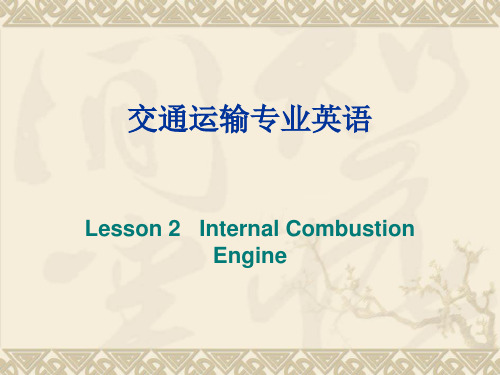
交通运输专业英语
Lesson 2
Internal Combustion Engine (PartⅠ) 1.2compression ring 气环 3.Oil ring 4.Piston pin 5.Piston 6connecting rod 油环 活塞销 活塞 连杆 连杆小头 连杆大头 连杆轴瓦 连杆盖
crank n.曲柄 曲柄 rod n.杆,棒 杆 rock n.岩石,摇动;v.摇动,摆动 岩石, 摇动, 岩石 摇动; 摇动
distribute v. cam n. valve n.阀 阀 filter n.;v.
交通运输专业英语
Lesson 2
Internal Combustion Engine (PartⅠ)
introduce:介绍,引荐;引进;输入,传入 :介绍,引荐;引进;输入,
由于燃料在发动机气缸内燃烧,因此发动机被称为内燃机。在内燃机中, 由于燃料在发动机气缸内燃烧,因此发动机被称为内燃机。在内燃机中, 空气燃油混合气被引入一个封闭的气缸,并在那里完成压缩点火。 空气燃油混合气被引入一个封闭的气缸,并在那里完成压缩点火。 The burning of the fuel (combustion) causes a rapid rise in cylinder pressure which is converted to useful mechanical energy by the piston and crank-shaft. 燃烧引起气缸内压力迅速上升, 燃烧引起气缸内压力迅速上升,这部分内能被活塞和曲轴转化成有用的 机械能。 机械能。 fuel 燃料 汽油 petrol(英)gasoline(美) 柴油 英 美 柴油diesel fuel oil 燃油 fuel pump 燃油泵 add fuel to the fire 火上加油 fuel up 加燃料 填肚子
【北师大版高中英语必修一 Unit 2 (1)

Critical Thinking & Speaking
Do you think the announced rules of watching tennis are reasonable? If yes, in what ways are they reasonable?
Unit 2 Sports and Fitness
Talk Builder. Listen and Imitate.
Which emotions do the speakers express? Write JOY, SURPRISE, or DISAPPOINTMENT after each sentence in the Talk Builder.
Unit 2 Sports and Fitness
Lesson 2 RULES OF THE GAME
1st Period
Make a guess about what sport it is.
It is a game played on a court by two teams who hit a ball back and forth over a high net with the hands, each team trying to return the ball before it touches the ground.
3.Wait for the point or game to end before
_s_ta_n_d_in_g__up__o_r _le_a_v_in_g_y_o_u_r _se_a_t_.
4.When taking photos during the match,
__p_le_a_s_e_tu_r_n_o_f_f _yo_u_r_f_la_s_h_____.
2022年冀教版《Lesson2 Many Faces, One Picture》课件 (1)

2. What did Aunt Jane ask Jenny to do? She asked Jenny to take care of Zoe.
3. What pet would Danny like to have? Why? He’d like to have a pet dog. Because dogs are friendly and loyal.
3. You are wearing traditional clothes. wear 动词,“穿着〞 ,与它近义的有:put on, dress, in。 put on意思是“穿上〞, 强调动作。 dress意思是“给某人或自己穿衣服〞。 常用结构:dress sb./onesele一起作谓语,常接表示颜色或服装的词。 We’re all wearing new clothes. 我们都穿着新衣服。 Put on your coat, Jack. 穿上你的外套,杰克。 Mum is dressing my little sister. 妈妈正给我的小妹 妹穿衣服。 She is in red. 她穿着红衣服。
我妈妈同意给我买一条裙子。
6. Can you lend me your marker? lend 与borrow lend “借出〞,常用于lend sth. to sb. (把某物借给某 人); borrow “借入〞,常用于borrow sth. from sb.〔从某 人处借某物〕 注意:选择用lend还是borrow,要看动词与主语的关 系。
4. You look like a dancer. look like 与be like look like “看起来像〞,强调外貌;be like “像〞,强调性格。 The girl looks like her father, but she is like her mother very much. 这个女孩看起来像她 爸爸,但是性格很像她妈妈。
人教精通版六年级上册英语Unit1 习题课件 Lesson 2

Lesson2
R-精通版六年级上册
提示:点击 进入习
题
一
二
三
四
一、这是珍妮日记中的一些句子,读一读,根据 图片及首字母提示写出单词补全句子。
1. Ihavebat7:00inthemorning. 2. Igotosat7:30.
reakfast chool
A. theparkB. homeC. toschool ( A )3. School________at8:00inthemorning. A. beginsB. overC. begin
( A )4. Afterschool, I________somecleaning, butI________watchTV.
Todayhecomesbackverylate. Hismotheraskshim,
“John, whydoyoucomebacksolate?” Johnsays, “Ourteacherisangry. Sheasksaquestion(问题) inclass. Butnoonecananswer( 回 答 ) itexcept( 除 了 ) me.”ThenJohn'smotherasks, “Whatquestionisit?” Johnsays, “Thequestionis:whoputsink( 墨 水 ) onmychair? Myansweris:it'sme.”
3. Ihavelaut1n2c:h 00. 4. Ihavedat7:00intheeveningwithmyfamily.
inner
二、单项选择。
( )1.—________doyouhavelunch? B
冀教版七年级英语上册 Unit 1 Lesson 2 课件(共26张PPT)
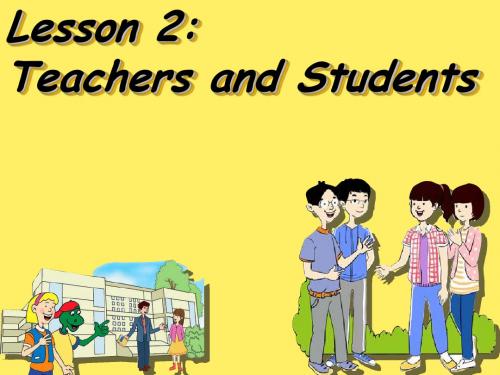
Skyler Class One
Let’s get to know more friends! A: What’s her/his name? B: Her/His name is…
She/He is in…
Carmen Class Two
Connor Class Three
Listen to Part 1. Fill in the blanks.
1. This is Ms. Liu. _S_h_e_ is a teacher. 2. This is Li Ming. _H_e_ is a boy. 3. _T_h_i_s is Jenny. _S_h_e_ is a girl. 4. They are my _fr_i_e_n_d_s (朋友). 5. He is a _s_tu__d_e_n_t (学生).
1. Read Part 1 and fill in the blanks.
1. Yang Hao is in Class __F_o_u_r_. 2. Li Lin is in Class __F_iv_e__.
Match the people with the descriptions.
homeroom teacher
She’s in Class _F_i_v_e. C: Nice _to_ meet you, Li Lin.
D: Nice to m__e_e_t you, t_o_o_.
Nice to meet you!
This is… His/Her name is...
He/She is in…
Nice to meet you,
Lesson 2: Teachers and Students
新概念英语第一册单词完整版
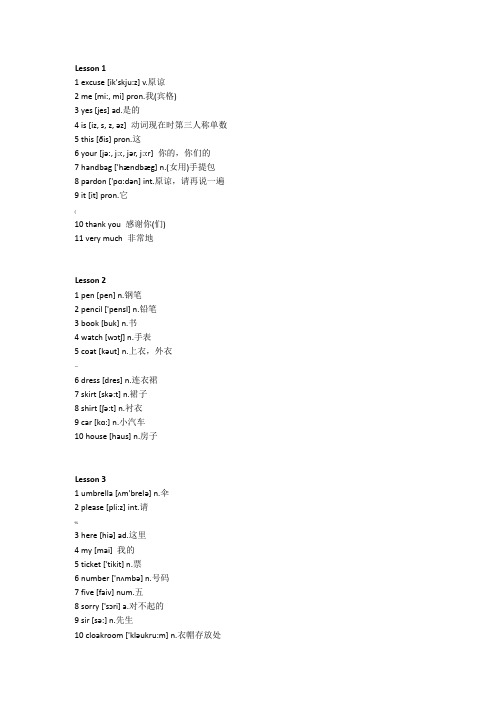
Lesson 11 excuse [ik'skju:z] v.原谅2 me [mi:, mi] pron.我(宾格)3 yes [jes] ad.是的4 is [iz, s, z, əz] 动词现在时第三人称单数5 this [ðis] pron.这6 your [jə:, jɔ:, jər, jɔ:r] 你的,你们的7 handbag ['hændbæg] n.(女用)手提包8 pardon ['pɑ:dən] int.原谅,请再说一遍9 it [it] pron.它(10 thank you 感谢你(们)11 very much 非常地Lesson 21 pen [pen] n.钢笔2 pencil ['pensl] n.铅笔3 book [buk] n.书4 watch [wɔtʃ] n.手表5 coat [kəut] n.上衣,外衣—6 dress [dres] n.连衣裙7 skirt [skə:t] n.裙子8 shirt [ʃə:t] n.衬衣9 car [kɑ:] n.小汽车10 house [haus] n.房子Lesson 31 umbrella [ʌm'brelə] n.伞2 please [pli:z] int.请%3 here [hiə] ad.这里4 my [mai] 我的5 ticket ['tikit] n.票6 number ['nʌmbə] n.号码7 five [faiv] num.五8 sorry ['sɔri] a.对不起的9 sir [sə:] n.先生10 cloakroom ['kləukru:m] n.衣帽存放处—Lesson 41 suit [su:t, sju:t] n.一套衣服 4 son [sʌn] n.儿子2 school [sku:l] n.学校3 teacher ['ti:tʃə] n.老师 5 daughter ['dɔ:tə] n.女儿Lesson 51 Mr. ['mistə] 先生2 good [gud] a.好3 morning ['mɔ:niŋ] n.早晨<4 Miss [mis] 小姐5 new [nju:] a.新的6 student ['stju:dənt] n.学生7 French [frentʃ] a.& n.法国人8 German ['dʒə:mən] a.& n.德国人9 nice ['nais] a.美好的10 meet [mi:t] v.遇见11 Japanese [ˌdʒæpə'ni:z] a.& n.日本人12 Korean [kə'riən] a.& n.韩国人13 Chinese [ˌtʃai'ni:z] a.& n.中国人`14 too [tu:] ad.也Lesson 61 make [meik] n.(产品的)牌号2 Swedish ['swi:diʃ] a.瑞典的3 English ['iŋgliʃ] a.英国的4 American [ə'merikən] a.美国的5 Italian [i'tæliən] a.意大利的6 Volvo ['vɔlvəʊ] n.沃尔沃7 Peugeot n.标致8 Mercedes ['mə:sidi:z] n.梅赛德斯9 Toyota ['təʊjəʊtə] n.丰田10 Daewoo n.大宇11 Mini ['mini] n.迷你12 Ford [fɔ:d] n.福特13 Fiat ['faiæt, -ət] n.菲亚特!Lesson 71 I [ai] pron.我2 am [m, əm, æm] 动词现在时第一人称单数3 are [ɑ:]动词现在时复数4 name ['neim] n.名字5 what [wɔt, wɑ:t] a.& pron.什么6 nationality [ˌnæʃə'næliti] n.国籍7 job [dʒɔb] n.工作8 keyboard ['ki:bɔ:d] n.电脑键盘·9 operator ['ɔpəreitə] n.操作人员10 engineer [ˌendʒi'niə] n.工程师Lesson 81 policeman [pə'li:smən] n.警察2 policewoman [pə'li:s,wumən] n.女警察3 taxi driver 出租汽车司机4 air hostess 空中小姐5 postman ['pəustmən] n.邮递员6 nurse [nə:s] n.护士7 mechanic [mi'kænik] n.机械师"8 hairdresser ['heəˌdresə] n.理发师9 housewife ['hauswaif] n.家庭妇女10 milkman ['milkmən] n.送牛奶的人Lesson 91 hello [hə'ləu] int.喂(表示问候)2 hi [hai] int.喂,嗨3 how [hau] ad.怎样4 today [tə'dei] ad.今天5 well [wel] a.身体好-6 fine [fain] a.美好的7 thanks [θæŋks] int.谢谢8 goodbye [ˌgud'bai] int.再见9 see [si:] v.见Lesson 101 fat [fæt] a.胖的2 woman ['wumən] n.女人3 thin [θin] a.瘦的4 tall [tɔ:l] a.高的5 short [ʃɔ:t] a.矮的6 dirty ['də:ti] a.脏的7 clean [kli:n] a.干净的8 hot [hɔt] a.热的、9 cold [kəuld] a.冷的10 old [əuld] a.老的11 young [jʌŋ] a.年轻的12 busy ['bizi] a.忙的13 lazy ['leizi] a.懒的Lesson 111 whose [hu:z] pron.谁的2 blue [blu:] a.蓝色的3 perhaps [pə'hæps] ad.大概{4 white [wait] a.白色的5 catch [kætʃ] v.抓住Lesson 121 father ['fɑ:ðə] n.父亲2 mother ['mʌðə] n.母亲3 blouse [blauz] n.女衬衫4 sister [sistə] n.姐,妹5 tie [tai] n.领带6 brother ['brʌðə] n.兄,弟7 his [hiz] 他的8 her [hə:] 她的Lesson 13)1 colour ['kʌlə] n.颜色2 green [gri:n] a.绿色3 come [kʌm] v.来4 upstairs [ˌʌp'steəz] ad.楼上5 smart [smɑ:t] a.时髦的,巧妙的6 hat [hæt] n.帽子7 same [seim] a.相同的8 lovely ['lʌvli] a.可爱的,秀丽的Lesson 14|1 case [keis] n. 箱子2 carpet ['kɑ:pit] n. 地毯3 dog [dɔg] n. 狗Lesson 151 Customs ['kʌstəmz] n. 海关2 officer ['ɔfisə] n. 官员3 girl [gə:l] n. 女孩,姑娘4 Danish ['deiniʃ] a.& n. 丹麦人5 friend ['deiniʃ] a.& n. 丹麦人6 Norwegian [nɔ:'wi:dʒən] a.& n. 挪威人7 passport ['pɑ:spɔ:t] n.护照(8 brown [braun] a. 棕色的9 tourist ['tuərist] n. 旅游者Lesson 161 Russian ['rʌʃən] a.& n. 俄罗斯人2 Dutch [dʌtʃ] a.& n. 荷兰人3 these [ði:z] pron. 这些(this的复数)4 red [red] a. 红色的5 grey [grei] a. 灰色的6 yellow ['jeləu] a. 黄色的@7 black [blæk] a. 黑色的8 orange ['ɔrindʒ] a. 橘黄色的Lesson 171 employee [im'plɔi-i:] n.雇员2 hard-working ['hɑ:dwə:kiŋ] a. 勤奋的3 sales reps 推销员4 man [mæn] n. 男人5 office ['ɔfis] n. 办公室¥6 assistant [ə'sistənt] n. 助手Lesson 191 matter ['mætə] n. 事情2 children ['tʃildrən] n. 孩子们(child 的复数)3 tired ['taiəd] a. 累,疲乏4 boy [bɔi] n. 男孩5 thirsty ['θə:sti] a. 渴6 mum ['mʌm] n. 妈妈(儿语))7 sit down [ˌsit'daun]坐下8 right [rait] a. 好,可以9 ice cream [ˌais'kri:m]冰淇淋Lesson 201 big [big] a.大的2 small [smɔ:l] a.小的3 open ['əupən] a.开着的4 shut [ʃʌt] a.关着的…5 light [lait] a.轻的6 heavy ['hevi] a.重的7 long [lɔŋ] a.长的8 shoe [ʃu:] n.鞋子9 grandfather ['grændˌfɑ:ðə] n.祖父,外祖父10 grandmother ['grænˌmʌðə] n.祖母,外祖母Lesson 21|1 give [giv] v. 给2 one [wʌn] pron. 一个3 which [witʃ] 哪一个Lesson 221 empty ['empti] a.空的2 full [ful] a.满的3 large [lɑ:dʒ] a.大的4 little ['litl] a.小的5 sharp [ʃɑ:p] a.尖的,锋利的6 small [smɔ:l] a.小的7 big [big] a.大的8 blunt [blʌnt] a.钝的`9 box [bɔks] n.盒子,箱子10 glass [glɑ:s] n.杯子11 cup [kʌp] n.茶杯12 bottle ['bɔtl] n.瓶子13 tin [tin] n.罐头14 knife [naif] n.刀子15 fork [fɔ:k] n.叉子Lesson 231 on [ɔn] prep. 在…之上2 shelf [ʃelf] n. 架子,搁板>Lesson 241 desk [desk] n.课桌2 table ['teibəl] n.桌子3 plate [pleit] n.盘子4 cupboard ['kʌbəd] n.食橱5 cigarette [ˌsigə'ret] n.香烟6 television ['teliˌviʒən, ˌteli'viʒən] n.电视机7 floor [flɔ:] n.地板8 dressing table 梳妆台9 magazine [ˌmægə'zi:n] n.杂志;10 bed [bed] n.床11 newspaper ['nju:sˌpeipə] n.报纸12 stereo ['steriəu, 'stiər-] n.立体声音响Lesson 251 Mrs. ['misiz] 夫人2 kitchen ['kitʃin] n.厨房3 refrigerator [ri'fridʒəreitə] n.电冰箱4 right [rait] n.右边5 electric [i'lektrik] a.带电的,可通电的!6 left [left] n.左边7 cooker ['kukə] n.炉子,炊具8 middle ['midl] n.中间9 of [əv, ə, ɔv] prep.(属于)…的10 room [ru:m] n.房间11 cup [kʌp] n.杯子Lesson 261 where [weə] ad.在哪里2 in [in] prep.在…里^Lesson 271 living room ['liviŋ ru:m]客厅2 near [niə] prep.靠近3 window ['windəu] n.窗户4 armchair ['ɑ:mtʃeə] n.手扶椅5 door [dɔ:] n.门6 picture ['piktʃə] n.图画7 wall [wɔ:l] n.墙%Lesson 281 trousers ['trauzəz] n.〔复数〕长裤Lesson 291 shut [ʃʌt] v.关门2 bedroom ['bedrum, -ru:m] n.卧室3 untidy [ˌʌn'taidi] a.乱,不整齐4 must [mʌst] modal verb.必须,应该5 open ['əupən] v.打开|6 air [eə] v.使…通风,换换空气7 put [put] v.放置8 clothes [kləuðz] n.衣服9 wardrobe ['wɔ:drəub] n.大衣柜10 dust [dʌst] v.掸掉灰尘11 sweep [swi:p] v.扫Lesson 301 empty ['empti] v.倒空,使…变空·2 read [ri:d] v.读3 sharpen ['ʃɑ:pən] v.削尖,使锋利4 put on [ˌput'ɔn] 穿上5 take off 脱掉6 turn on [tə:n ɔn] 开(电灯)7 turn off 关(电灯)Lesson 311 garden ['gɑ:dn] n.花园2 under ['ʌndə] prep.在…之下(3 tree [tri:] n.树4 climb [klaim] v.爬,攀登5 who [hu:] pron.谁6 run [rʌn] v.跑7 grass [grɑ:s] n.草,草地8 after ['ɑ:ftə] prep.在…之后9 cat [kæt] n.猫Lesson 321 type [taip] v.打字?2 letter ['letə] n.信3 basket ['bɑ:skit] n.篮子4 eat [i:t] v.吃5 bone [bəun] n.骨头6 clean [kli:n] v.清洗7 tooth [tu:θ] n.牙齿8 cook [kuk] v.做(饭菜)9 milk [milk] n.牛奶10 meal [mi:l] n.饭,一顿饭、11 drink [driŋk] v.喝12 tap [tæp] n.(水)龙头Lesson 331 day [dei] n.日子15 fly [flai] v.飞2 cloud [klaud] n.云3 sky [skai] n.天空4 sun [sʌn] n.太阳5 shine [ʃain] v.照耀6 with [wið, wiθ] prep.和…在一起]7 family ['fæməli] n.家庭(成员)8 walk [wɔ:k] v.走路,步行9 over ['əuvə] prep.跨越,在…之上10 bridge [bridʒ] n.桥11 boat [bəut] n.船12 river ['rivə] n.河13 ship [ʃip] n.轮船14 aeroplane ['eərəplein] n.飞机Lesson 341 sleep [sli:p] v.睡觉(2 shave [ʃeiv] v.刮脸3 cry [krai] v.哭,喊4 wash [wɔʃ] v.洗5 wait [weit] v.等6 jump [dʒʌmp] v.跳Lesson 351 photograph ['fəutəgrɑ:f] n.照片15 into ['intu, 'intə] prep.进入2 village ['vilidʒ] n.村庄3 valley ['væli] n.山谷14 park [pɑ:k] n.公园》4 between [bi'twi:n] prep.在…之间5 hill [hil] n.小山6 another [ə'nʌðə] prep.另一个7 wife [waif] n.妻子8 along [ə'lɔŋ] prep.沿着9 bank [bæŋk] n.河岸10 water ['wɔ:tə] n.水11 swim [swim] v.游泳12 across [ə'krɔs] prep.横过13 building ['bildiŋ] n.大楼,建筑物:Lesson 361 beside [bi'said] prep.在…旁2 off [ɔf] prep.离开Lesson 371 work [wə:k] v.工作2 hard ['hɑ:d] ad.努力地3 make [meik] v.做4 bookcase ['buk-keis] n.书橱,书架(5 hammer ['hæmə] n.锤子6 paint [peint] v.上漆,涂7 pink [piŋk] n.& a.粉红色8 favourite ['feivərit] a.最喜欢的Lesson 381 homework ['həumwə:k] n.作业2 listen ['lisən] v.听3 dish [diʃ] n.盘子,碟子Lesson 39:1 front [frʌnt] n.前面2 in front of 在…之前3 careful ['keəful] a.小心的,仔细的4 vase [vɑ:z, veis, veiz] n.花瓶5 drop [drɔp] v.掉下6 flower ['flauə] n.花Lesson 401 show [ʃəu] v.给…看2 send [send] v.送给3 take [teik] v.带给Lesson 41@1 cheese [tʃi:z] n.乳酪,干酪2 bread [bred] n.面包3 soap [səup] n.肥皂4 chocolate ['tʃɔklit] n.巧克力5 sugar ['ʃugə] n.糖6 coffee ['kɔfi] n.咖啡7 tea [ti:] n.茶8 tobacco [tə'bækəu] n.烟草,烟丝Lesson 42<1 bird [bə:d] n.鸟2 any ['eni] det.一些3 some [sʌm] det.一些Lesson 431 of course [əv'kɔ:s] 当然2 kettle ['ketl] n.水壶3 behind [bi'haind] prep.在…后面4 teapot ['ti:pɔt] n.茶壶5 now [nau] ad.现在,此刻*6 find [faind] v.找到7 boil [bɔil] v.沸腾,开Lesson 451 can [kæn] 能够2 boss [bɔs] n.老板,上司3 minute ['minit, mai'nju:t] n.分(钟)4 ask [ɑ:sk] v.请求,要求5 handwriting ['hændˌraitiŋ] n.书写6 terrible ['terəbəl] a.糟糕的,可怕的}Lesson 461 lift [lift] v.拿起,搬起,举起2 cake [keik] n.饼,蛋糕3 biscuit ['biskit] n.饼干Lesson 471 like [laik] v.喜欢,想要2 want [wɔnt, wɑ:nt] v.想Lesson 48(1 fresh [freʃ] a.新鲜的2 egg [eg] n.鸡蛋3 butter ['bʌtə] n.黄油4 pure [pjuə] a.纯净的5 honey ['hʌni] n.蜂蜜6 ripe [raip] a.成熟的7 banana [bə'nɑ:nə] n.香蕉8 jam [dʒæm] n.果酱9 sweet [swi:t] a.甜的10 orange ['ɔrindʒ] n.橙:11 Scotch whisky 苏格兰威士忌12 choice [tʃɔis] a.上等的,精选的13 apple ['æpəl] n.苹果14 wine [wain] n.酒,果酒15 beer [biə] n.啤酒16 blackboard ['blækbɔ:d] n.黑板Lesson 491 butcher ['butʃə] n.卖肉的2 meat [mi:t] n.(食用)肉…3 beef [bi:f] n.牛肉4 lamb [læm] n.羔羊肉5 husband ['hʌzbənd] n.丈夫6 steak [steik] n.牛排7 mince [mins] n.肉馅,绞肉8 chicken ['tʃikin] n.鸡9 tell [tel] v.告诉10 truth [tru:θ] n.实情11 either ['aiðə] ad.也(用于否定句).Lesson 501 tomato [tə'mɑ:təu] n.西红柿2 potato [pə'teitəu] n.土豆3 cabbage ['kæbidʒ] n.卷心菜4 lettuce ['letis] n.莴苣5 pea [pi:] n.豌豆6 bean [bi:n] n.豆角7 pear [peə] n.梨8 grape [greip] n.葡萄`9 peach [pi:tʃ] n.桃Lesson 511 Greece [gri:s] n.希腊2 climate ['klaimit] n.气候3 country ['kʌntri] n.国家4 pleasant ['plezənt] a.宜人的5 weather ['weðə] n.天气6 spring [spriŋ] n.春季7 windy ['windi] a.有风的8 warm [wɔ:m] a.温暖的9 rain [rein] v.下雨10 sometimes ['sʌmtaimz] ad.有时11 summer ['sʌmə] n.夏天12 autumn ['ɔ:təm] n.秋天13 winter ['wintə] n.冬天14 snow [snəu] v.下雪>15 January ['dʒænjuəri] 月16 February ['februəri] 月17 March [mɑ:tʃ]月18 April ['eiprəl] 月19 May [mei] 月20 June [dʒu:n] 月21 July [dʒu'lai] 月22 August ['ɔ:gəst] 月23 September [sep'tembə] 月24 October [ɔk'təubə] 月25 November [nəu'vembə] 月26 December [di'sembə] 月¥Lesson 521 the . 美国2 Brazil [brə'zil] n.巴西3 Holland ['hɔlənd] n.荷兰4 England ['iŋglənd] n.英国5 France ['fræns] n.法国6 Germany ['dʒə:məni] n.德国7 Italy ['itəli] n.意大利8 Norway ['nɔ:wei] n.挪威9 Russia ['rʌʃə] n.俄罗斯(10 Spain [spein] n.西班牙11 Sweden ['swi:dn] n.瑞典Lesson 531 mild [maild] a.温和的,温暖的2 always ['ɔ:lweiz] ad.总是3 north [nɔ:θ] n.北方4 east [i:st] n.东方5 wet [wet] a.潮湿的6 west [west] n.西方7 south [sauθ] n.南方8 season ['si:zən] n.季节9 best [best] ad.最10 night [nait] n.夜晚11 rise [raiz] v.升起12 early ['ə:li] ad.早13 set [set] v.(太阳)落下去14 late [leit] ad.晚,迟[15 interesting ['intristiŋ] a.有趣的,有意思的16 subject ['sʌbdʒikt] n.话题17 conversation [ˌkɔnvə'seiʃən] n.谈话课文请查看541 Australia [ɔ'streiliə] n.澳大利亚2 Australian [ɔ'streiliən] n.澳大利亚人3 Austria ['ɔstriə] n.奥地利4 Austrian ['ɔstriən] n.奥地利人5 Canada ['kænədə] n.加拿大6 Canadian [kə'neidiən] n.加拿大人7 China ['tʃainə] n.中国8 Finland ['finlənd] n.芬兰9 Finnish ['finiʃ] n.芬兰人10 India ['indiə] n.印度11 Indian ['indiən] n.印度人12 Japan [dʒə'pæn] n.日本13 Nigeria [nai'dʒiəriə] n.尼日利亚14 Nigerian [nai'dʒiəriən] n.尼日利亚人}15 Turkey ['tə:ki] n.土耳其16 Turkish ['tə:kiʃ] n.土耳其人17 Korea [kə'riə, kɔ(:)'riə] n.韩国18 Polish ['pəuliʃ] n.波兰人19 Poland ['pəulənd] n.波兰20 Thai [tai] n.泰国人21 Thailand ['tailænd] n.泰国Lesson 551 live [liv] v.住,生活2 stay [stei] v.呆在,停留3 home [həum] n.家ad.在家,到家4 housework ['hauswə:k] n.家务:5 lunch [lʌntʃ] n.午饭6 afternoon [ˌɑ:ftə'nu:n] n.下午7 usually ['ju:ʒuəli, 'ju:ʒəli] ad.通常8 together [tə'geðə] ad.一起9 evening ['i:vniŋ] n.晚上10 arrive [ə'raiv] v.到达11 night [nait] n.夜间Lesson 571 o'clock [ə'klɔk] ad.点钟>2 shop [ʃɔp] n.商店3 moment ['məumənt] n.片刻,瞬间Lesson 591 envelope ['envələup] n.信封2 writing paper 信纸3 shop assistant 售货员4 size [saiz] n.尺寸,尺码,大小5 pad [pæd] n.信笺簿6 glue [glu:] n.胶水7 chalk [tʃɔ:k] n.粉笔%8 change [tʃeindʒ] n.零钱,找给的钱Lesson 611 feel [fi:l] v.感觉2 look [luk] v.看(起来)3 must [mʌst] 必须4 call [kɔ:l] v.叫,请5 doctor ['dɔktə] n.医生6 telephone ['telifəun] n.电话7 remember [ri'membə] v.记得,记住8 mouth [mauθ] n.嘴9 tongue [tʌŋ] n.舌头10 bad [bæd] a.坏的,严重的11 cold [kəuld] n.感冒12 news [nju:z] n.消息13 headache ['hedeik] n.头痛14 aspirin ['æspərin] n.阿斯匹林/15 earache ['iəreik] n.耳痛16 toothache ['tu:θeik] n.牙痛17 dentist ['dentist] n.牙医18 stomach ache 胃痛19 medicine ['medsən] n.药20 temperature ['tempərətʃə] n.温度21 flu [flu:] n.流行性感冒22 measles ['mi:zəlz] n.麻疹23 mumps [mʌmps] n.腮腺炎Lesson 631 better ['betə] a.形容词well的比较级2 certainly ['sə:tənli] ad.当然3 get up [get ʌp] 起床4 yet [jet] ad.还,仍5 rich [ritʃ] a.油腻的6 food [fu:d] n.食物,7 remain [ri'mein] v.保持,继续Lesson 641 play [plei] v.玩2 match [mætʃ] n.火柴3 talk [tɔ:k] v.谈话4 library ['laibrəri] n.图书馆5 drive [draiv] v.开车6 so [səu] ad.如此地7 quickly ['kwikli] ad.快地#8 lean out of 身体探出9 break [breik] v.打破Lesson 651 Dad [dæd] n.爸(儿语)2 key [ki:] n.钥匙3 baby ['beibi] n.婴儿4 hear [hiə] v.听见5 enjoy [in'dʒɔi] v.玩得快活6 yourself [jə'self] pron.你自己《7 ourselves [auə'selvz] pron.我们自己Lesson 661 myself [mai'self] pron.我自己2 themselves [ðəm'selvz] pron.他们自己3 himself [him'self] pron.他自己4 herself [hə:'self] pron.她自己Lesson 671 greengrocer['gri:nˌgrəusə] n.蔬菜水果零售商/2 absent ['æbsənt, əb'sent] a.缺席的3 Monday ['mʌndi] n.星期一4 Tuesday ['tju:zdi:, 'tu:z-] n.星期二5 Wednesday ['wenzdi] n.星期三6 Thursday ['θə:zdi] 星期四7 keep [ki:p] v.(身体健康)处于(状况) 8 spend [spend] v.度过9 weekend ['wi:kend, ˌwi:k'end] n.周末10 Friday ['fraidi] n.星期五11 Saturday ['sætədi] n.星期六12 Sunday ['sʌndi] n.星期日13 country ['kʌntri] n.乡村14 lucky ['lʌki] a.幸运的Lesson 681 church [tʃə:tʃ] n.教堂2 dairy ['deəri] n.乳品店!3 baker ['beikə] n.面包师傅4 grocer ['grəusə] n.食品杂货商Lesson 691 year [jiə, jə:] n.年2 race [reis] n.比赛3 town [taun] n.城镇4 crowd [kraud] n.人群5 stand [stænd] v.站立6 exciting [ik'saitiŋ] a.使人激动的7 just [dʒʌst] ad.正好,恰好]8 finish ['finiʃ] n.结尾,结束9 winner ['winə] n.获胜者10 behind [bi'haind] prop.在…之后11 way [wei] n.路途Lesson 711 awful ['ɔ:ful] ad.让人讨厌的,坏的2 telephone ['telifəun] v.& n.打电话3 time [taim] n.次(数)4 answer ['ɑ:nsə] v.接(电话)5 last [lɑ:st] a.最后的,前一次的6 phone [fəun] n.电话(=telephone)7 again [ə'gein] ad.又一次地8 say [sei] v.说]Lesson 731 week [wi:k] n.周2 London ['lʌndən] n.伦敦3 suddenly ['sʌdnli] ad.突然地4 bus stop ['bʌstɔp] 公共汽车车站5 smile [smail] v.微笑6 pleasantly ['plezntli] ad.愉快地7 understand [ˌʌndə'stænd] v.懂,明白8 speak [spi:k] v.讲,说9 hand [hænd] n.手10 pocket ['pɔkit] n.衣袋11 phrasebook n.短语手册,常用语手册12 phrase [freiz] n.短语13 slowly ['sləuli] ad.缓慢地Lesson 74(1 hurriedly ['hʌridli] ad.匆忙地2 cut [kʌt] v.割,切3 thirstily ['θə:stili] ad.口渴地4 go [gəu] v.走5 greet [gri:t] v.问候,找招呼Lesson 751 ago [ə'gəu] ad.以前2 buy [bai] v.买3 pair [peə] n.双,对4 fashion ['fæʃən] n.(服装的)流行式样5 uncomfortable [ʌn'kʌmftəbəl] a.不舒服的…6 wear [weə] v.穿着Lesson 771 appointment [ə'pɔintmənt] n.约会,预约2 urgent ['ə:dʒənt] a.紧急的,急迫的3 till [til] prep.直到…为止Lesson 791 shopping ['ʃɔpiŋ] n.购物2 list [list] n.单子~3 vegetable ['vedʒtəbəl] n.蔬菜4 need [ni:d] v.需要5 hope [həup] v.希望6 thing [θiŋ] n.事情7 money ['mʌni] n.钱Lesson 801 groceries ['grəusəriz] n.食品杂货2 fruit [fru:t] n.水果3 stationery ['steiʃənəri, -neri] n.文具4 newsagent ['nju:zˌeidʒənt] n.报刊零售人5 chemist ['kemist] n.化剂师,化学家》811 bath [bɑ:θ] n.洗澡2 nearly ['niəli] ad.几乎,将近3 ready ['redi] a.准备好的,完好的4 dinner ['dinə] n.正餐,晚餐5 restaurant ['restərɔnt] n.饭馆,餐馆6 roast [rəust] a.烤的Lesson 821 breakfast ['brekfəst] n.早饭2 haircut ['heəkʌt] n.理发3 party ['pɑ:ti] n.聚会4 holiday ['hɔlidi] n.假日!1 mess [mes] n.杂乱,凌乱2 pack [pæk] v.包装,打包,装箱3 suitcase ['su:tkeis, 'sju:t] n.手提箱4 leave [li:v] v.离开5 already [ɔ:l'redi] ad.已经Lesson 851 Paris ['pæris] n.巴黎~2 cinema ['sinimə] n.电影院3 film [film] n.电影4 beautiful ['bju:tifəl] a.漂亮的5 city ['siti] n.城市6 never ['nevə] ad.从来没有7 ever ['evə] ad.在任何时候Lesson 871 attendant [ə'tendənt] n.接待员2 bring [briŋ] v.带来,送来…3 garage ['gærɑ:ʒ] n.车库,汽车修理厂4 crash [kræʃ] n.碰撞5 lamp-post [læmp pəust] 灯杆6 repair [ri'peə] v.修理7 try [trai] v.努力,设法Lesson 891 believe [bi'li:v] v.相信,认为2 may [mei] (用于请求许可)可以3 how long 多长4 since [sins] prep.自从[5 why [wai] ad.为什么6 sell [sel] v.卖,出售7 because [bi'kɔz] conj.因为8 retire [ri'taiə] v.退休9 cost [kɔst] v.花费10 pound [paund] n.英镑11 worth [wə:θ] prep.值…钱12 penny ['peni] n.便士【1 still [stil] ad.还,仍旧2 move [mu:v] v.搬家3 miss [mis] v.想念,思念4 neighbour ['neibə] n.邻居5 person ['pə:sn] n.人6 people ['pi:pl] n.人们7 poor [puə] a.可怜的Lesson 931 pilot ['pailət] n.飞行员.2 return [ri'tə:n] v.返回3 New York ['nju: 'jɔ:k] n.纽约4 Tokyo ['təukjəu] n.东京5 Madrid [mə'drid] n.马德里6 fly [flai] v.飞行Lesson 941 Athens ['æθinz] n.雅典2 Berlin [bə:'lin] n.柏林3 Bombay [bɔm'bei] n.孟买4 Geneva [dʒi'ni:və] n.日内瓦{5 Moscow ['mɔskəu] n.莫斯科6 Rome [rəum] n.罗马7 Seoul [səul] n.汉城8 Stockholm ['stɔkhoum] n.斯德哥尔摩9 Sydney ['sidni] n.悉尼Lesson 951 return [ri'tə:n] n.往返2 train [trein] n.火车3 platform ['plætfɔ:m] n.站台4 plenty ['plenti] n.大量>5 bar [bɑ:] n.酒吧6 station ['steiʃən] n.车站,火车站7 catch [kætʃ] v.赶上8 miss [mis] v.错过Lesson 971 leave [li:v] v.遗留2 describe [di'skraib] v.描述3 zip [zip] n.拉链4 label ['leibəl] n.标签【5 handle ['hændl] n.提手,把手6 address [ə'dres] n.地址7 pence [pens] 的复数形式8 belong [bi'lɔŋ] v.属于Lesson 991 ow [au] int.哎哟2 slip [slip] v.滑倒,滑了一脚3 fall [fɔ:l] v.落下,跌倒4 downstairs [ˌdaun'steəz] ad.下楼(5 hurt [hə:t] v.伤,伤害,疼痛6 back [bæk] n.背7 stand up 起立,站起来8 help [help] v.帮助9 at once [ət 'wʌns] 立即10 sure [ʃuə] a.一定的,确信的11 X-ray ['eksrei] 光透视Lesson 1011 Scotland ['skɔtlənd] n.苏格兰(英国)·2 card [kɑ:d] n.明信片3 youth [ju:θ] n.青年4 hostel ['hɔstəl] n.招待所,旅馆5 association [əˌsəusi'eiʃən] n.协会6 soon [su:n] ad.不久7 write [rait] v.写Lesson 1031 exam [ig'zæm] n.考试2 pass [pɑ:s] v.及格,通过3 mathematics [ˌmæθə'mætiks] n.数学4 question ['kwestʃən] n.问题5 easy ['i:zi] a.容易的6 enough [i'nʌf] ad.足够地*7 paper ['peipə] n.考卷8 fail [feil] v.未及格,失败9 answer ['ɑ:nsə] v.回答10 mark [mɑ:k] n.分数11 rest [rest] n.其他的东西12 difficult ['difikəlt] a.困难的13 hate [heit] v.讨厌14 low [ləu] a.低的15 cheer [tʃiə] v.振作,振奋16 guy [gai] n.家伙,人17 top [tɔp] n.上方,顶部Lesson 1041 clever ['klevə] a.聪明的2 stupid ['stju:pid] a.笨的3 cheap [tʃi:p] a.便宜的4 expensive [ik'spensiv] a.贵的】5 fresh [freʃ] a.新鲜的6 stale [steil] a.变馊的7 low [ləu] a.低的,矮的8 loud [laud] a.大声的9 high [hai] a.高的10 hard ['hɑ:d] a.硬的11 sweet [swi:t] a.甜的12 soft [sɔft] a.软的13 sour [sauə] a.酸的:Lesson 1051 spell [spel] v.拼写2 intelligent[in'telidʒənt] a.聪明的,有智慧的3 mistake [mis'teik] n.错误4 present [pri'zent, 'prezənt] n.礼物5 dictionary ['dikʃənəri] n.词典Lesson 1061 carry ['kæri] v.携带2 correct [kə'rekt] v.改正,纠正<Lesson 1071 madam ['mædəm] n.夫人,女士(对妇女的尊称)2 as well 同样3 suit [su:t, sju:t] v.适于4 pretty ['priti] a.漂亮的Lesson 1091 idea [ai'diə] n.主意2 a little 少许(用于不可数名词之前)3 teaspoonful ['ti:spu:nful] n.一满茶匙#4 less [les] a.(little的比较级)校少的,更小的5 a few 几个(用于可数名词之前)6 pity ['piti] n.遗憾7 instead [in'sted] ad.代替8 advice [əd'vais] n.建议,忠告Lesson 1101 most [məust] a.(many,much的最高级)最多的2 least [li:st] a.(little的最高级)最小的,最少的3 best [best] a.(good的最高级)最好的4 worse [wə:s] a.(bad的比较级)更坏的5 worst [wə:st] a.(bad的最高级)最坏的:Lesson 1111 model ['mɔdl] n.型号,式样2 afford [ə'fɔ:d] v.付得起(钱)3 deposit [di'pɔzit] n.预付定金4 instalment [in'stɔ:lmənt] n.分期付款5 price [prais] n.价格6 millionaire [ˌmiljə'neə] n.百万富翁Lesson 1131 conductor [kən'dʌktə] n.售票员2 fare [feə] n.车费,车票3 change [tʃeindʒ] v.兑换(钱)4 note [nəut] n.纸币5 passenger ['pæsindʒə] n.乘客6 none [nʌn] pron.没有任何东西^7 neither ['naiðə, 'ni:ðə] ad.也不8 get off 下车9 tramp [træmp] n.流浪汉10 except [ik'sept] prep.除…外Lesson 1151 anyone['eniwʌn]pron.(用于疑问句,否定式)任何人2 knock [nɔk] v.敲,打3 everything ['evriθiŋ] pron.一切事物4 quiet ['kwaiət] a.宁静的,安静的5 impossible [im'pɔsəbəl] a.不可能的6 invite [in'vait] v.邀请'7 anything ['eniθiŋ] pron.任何东西8 nothing ['nʌθiŋ] pron.什么也没有9 lemonade [ˌlemə'neid] n.柠檬水10 joke [dʒəuk] v.开玩笑Lesson 1161 asleep [ə'sli:p] a.睡觉,睡着(用作表语)2 glasses ['gla:siz] n.眼镜Lesson 1171 dining room 饭厅2 coin [kɔin] n.硬币!3 mouth [mauθ] n.嘴4 swallow [swɔləu] v.吞下5 later ['leitə] ad.后来6 toilet ['tɔilit] n.厕所,盥洗室Lesson 1181 ring [riŋ] v.响Lesson 1191 story ['stɔ:ri] n.故事2 happen ['hæpən] v.发生3 thief [θi:f] n.贼>4 enter ['entə] v.进入5 dark [dɑ:k] a.黑暗的6 torch [tɔ:tʃ] n.手电筒7 voice [vɔis] n.(说话的)声音8 parrot ['pærət] n.鹦鹉Lesson 1201 exercise book 练习本Lesson 121@1 customer ['kʌstəmə] n.顾客2 forget [fə'get] v.忘记3 manager ['mænidʒə] n.经理4 serve [sə:v] v.照应,服务,接待5 counter ['kauntə] n.柜台6 recognize ['rekəgnaiz] v.认识Lesson 1221 road [rəud] n.路·Lesson 1231 during ['djuəriŋ] prep.在…期间2 trip [trip] n.旅行3 travel ['trævəl] v.旅行4 offer ['ɔfə] v.提供5 job [dʒɔb] n.工作6 guess [ges] v.猜7 grow [grəu] v.长,让…生长8 beard [biəd] n.(下巴上的)胡子,络腮胡子Lesson 124[1 kitten ['kitn] n.小猫Lesson 1251 water ['wɔ:tə] v.浇水2 terribly ['terəbli] ad.非常3 dry [drai] a.干燥的,干的4 nuisance ['nju:səns] n.讨厌的东西或人5 mean [mi:n] v.意味着,意思是6 surprise [sə'praiz] n.惊奇,意外的事Lesson 1261 immediately [i'mi:diətli] ad.立即地…Lesson 1271 famous ['feiməs] a.著名的2 actress ['æktris] n.女演员3 at least 至少4 actor ['æktə] n.男演员5 read [ri:d] v.通过阅读得知Lesson 1291 wave [weiv] v.招手2 track [træk] n.跑道3 mile [mail] n.英里4 overtake [ˌəuvə'teik] v.从后面超越,超车5 speed [spi:d] 限速6 dream [dri:m] v.做梦,思想不集中7 sign [sain] n.标记,牌子8 driving licence ['draiviŋ 'laisəns] 驾驶执照9 charge [tʃɑ:dʒ] v.罚款10 darling ['dɑ:liŋ] n.亲爱的(用作表示称呼)Lesson 1311 Egypt ['i:dʒipt] n.埃及2 abroad [ə'brɔ:d] ad.国外3 worry ['wʌri] v.担忧Lesson 1331 reporter [ri'pɔ:tə] n.记者sensational [sen'seiʃənəl]a.爆炸性的,耸人听闻的3 mink coat ['miŋk-kəut] 貂皮大衣Lesson 1351 future ['fju:tʃə] n.未来的2 get married 结婚3 hotel [həu'tel] n.饭店4 latest ['leitist] a.最新的5 introduce ['intrə'dju:s] v.介绍Lesson 1371 football ['futbɔ:l] n.足球2 pool [pu:l] n.赌注3 win [win] v.赢4 world [wə:ld] n.世界5 poor [puə] a.贫穷的6 depend [di'pend] v.依靠(on)Lesson 1391 extra ['ekstrə] a.额外的2 engineer [ˌendʒi'niə] n.工程师3 overseas [ˌəuvə'si:z] a.海外的,国外的4 engineering [ˌendʒi'niəriŋ] n.工程5 company ['kʌmpəni] n.公司6 line [lain] n.线路Lesson 1411 excited [ik'saitid] a.兴奋的2 get on 登上3 middle-aged ['midl'eidʒid] a.中年的4 opposite ['ɔpəzit] prep.在…对面5 curiously ['kjuəriəsli] ad.好奇地6 funny ['fʌni] a.可笑的,滑稽的7 powder ['paudə] n.香粉8 compact ['kɔmpækt] n.带镜的化妆盒9 kindly ['kaindli] ad.和蔼地10 ugly ['ʌgli] a.丑陋的11 amused [ə'mju:zd] a.有趣的12 smile [smail] v.微笑13 embarrassed [im'bærəst] a.尴尬的,窘迫的Lesson 1421 worried ['wʌrid] a.担心,担忧2 regularly ['regjuləli] ad.经常地,定期地Lesson 1431 surround [sə'raund] v.包围2 wood [wud] n.树林3 beauty spot 风景点4 hundred ['hʌndrid] n.百5 city ['siti] n.城市6 through [θru:] prep.穿过7 visitor ['vizitə] n.参观者,游客,来访者8 tidy ['taidi] a.整齐的9 litter ['litə] n.杂乱的东西10 litter basket 废物筐11 place [pleis] v.放12 throw [θrəu] v.扔,抛13 rubbish ['rʌbiʃ] n.垃圾14 count [kaunt] v.数,点15 cover ['kʌvə] v.覆盖16 piece [pi:s] n.碎片17 tyre ['taiə] n.轮胎18 rusty ['rʌsti] a.生锈的19 among [ə'mʌŋ] prep.在…之间20 prosecute ['prɔsikju:t] v.依法处置课文请查看…。
马承英语2B lesson2第一二课时
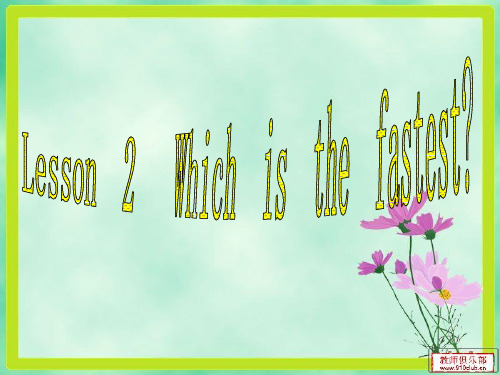
• 完成练习册第二课时的第 二大题
Which is faster , an ant or a snail? The ant is.
Which is the fastest , an ant , a snake or a snail? The snake is.
Which
is
faster , an ant
or a sna
The ant is. The ant snail. is faster than the
Which is the fastest , an ant , a snake or a snail? The snake is. The snake three. is the fastest of the
• 完成练习册第二课时的三 大题
• 家长每天(从星期一到星期五)听写 lesson2单词表中的单词从ant到 remember并签名。 • 背诵Diagloue 1的对话,家长签名。 • 预习Diagloue 2 和第四课时 Do you know?
faster
fiercer slower
fastest
fiercest slowest
heavy
heavier
he aviest
wide large
wider larger
widest largest
big
bigger
biggest
thin hot
thinner
thinnest hottest
•
完成练习册第一课时 的二三大题
教学内容:Dialogue 1&Gramma
• 教学重点:---Which is the
fastest/fiercest...? /is. favourite...? ---The A / B /C
新概念英语第二册逐句精讲Lesson1~3

【导语】新概念英语之所以经久不衰是因为以其全新的教学理念,有趣的课⽂内容和全⾯的技能训练,为英语学习者排忧解难,深受⼴⼤英语学习者的欢迎和喜爱。
想要学好英语的你,怎能错过?快来加⼊学习吧!⽆忧考为您提供了以下内容,希望能够为⼤家学习新概念英语提供帮助!新概念英语第⼆册逐句精讲Lesson1 st week I went to the theatre.上星期我去看戏。
语⾔点1 时间状语开门见⼭,点明时态为过去时,因⽽谓语动词go to使⽤过去式went to。
语⾔点2 在theatre,cinema,picture等名词前⼀定要加定冠词the。
如:go to the theatre/play去看戏;go to thecinema/movies去看电影(英/美);go to the pictures/films去看电影;be at the theatre/cinema在戏院看戏/在电*看电影。
2.I had a very good seat.我的座位很好。
语⾔点1 had为have的过去式,延续last week所要求的时态。
语⾔点2 a very good seat=a very good place指视线⽆遮挡,所处位置⾮常好,⽽⾮椅⼦本⾝材料好。
3.The play was very interesting.那场戏⾮常有意思。
语⾔点 very是副词,interesting是形容词,副词修饰形容词⼀般放在形容词前。
good enough是特例。
4. I did not enjoy it. 我却⽆法欣赏。
语⾔点1 did not常⽤于正式写作中,其缩写didn't常在⼝语中使⽤,类似有:cannot/can not=can't,could not=couldn't,do not=don't,will not=won't,shall not=shan't,have not=haven't等。
新概念英语第一册Lesson2课件
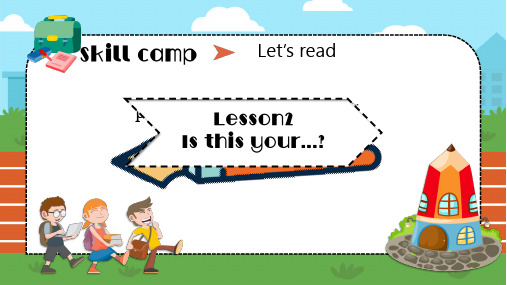
含有be动词的一般疑问句的构成:
但如果句子主语是第一人称,变成一般疑问句时 要将主语换成第二人称。如:
I’m a student.
Are you a student?
一般疑问句的回答:
一般疑问句的肯定回答一般为 “Yes,...”, 而否定 回答为 “No,...”。如:
Is this your house? 这是你的房子吗?
一般疑问句的概念: 能用yes/no(或相当于yes/no)回答的问句叫一般 疑问句。
含有be动词的一般疑问句的构成:
当陈述句中有be动词(am, is, are)时,可直接将 be动词提至主语前。如:
He is a worker.
She is eleven years old.
Is he a worker? Is she eleven years old?
Let’s write
提示词:excuse, yes, shoe, pardon, thank
Is thEixscuyoseurmseh!oe?
Thank PYyeaoYsrued.istov?iensr?.y much.
英语中be动词有am, is, are三种形式,它们分别和不同的人 称代词连用,我们先来学一学is的用法。请看下表:
Amazing world
Hi, guys!你们听过“包治百病” 这个词语吗?它的本意是“一 切疾病都可以治疗。”,不过 现在网络的流行说法是“包包 可以缓解女性不开心的情绪。” 可见,女士们对handbag的钟 爱啦!下面,请跟我一起看看 世界顶级品牌之一的迪奥包包 的制作过程吧!
This
your
pen.
It
is
your
watch.
新概念英语第二册Lesson1Lesson2完整版

pay no attention pay little attention pay close attention pay more attention
不注意 有点注意 密切注意 更多注意
Why did the writer complain to the
people behind him?
Because they were talking loudly
Summary Writing
• 1、Where did the writer go last week? • 2、Did he enjoy the play or not? • 3、Who was sitting behind him? • 4、Were they talking loudly ,or they talking quietly ? • 5、Could the writer hear the actors or not? • 6、Did he turn around or not? • 7、What did he say? • 8、Did the young man say ,“the play is not interesting”
• 'It's none of your business,' the young man said rudely. 'This is a private conversation!'
Explain the text
1.重点短语:go to the+地点 表示去某地干嘛 eg: in hospital 住院 in the hospital 去医院 go to the school 去学校 go to school 上学 表明你的身份一定是学生,是去 上学的,而加了定冠词the之后表明你的身份不定了。 相同的还有church和hospital等。
一年级上册英语教案-Unit1 Lesson2 人教新起点(2020秋)
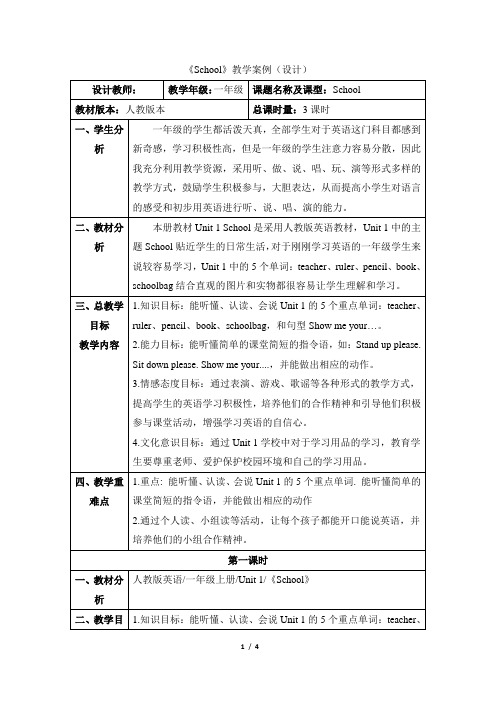
(1)趣味操练:I say you do
让同学们准备好尺子、铅笔、书本放在桌子上,当老师说:“Show me your pencil.”就立刻把铅笔举起来,当老师说:“Show me your book.”就立刻把书本举起来,当老师说:“Show me your ruler.”就立刻把尺子举起来。(让学生听懂“Show me your…”并做出相应的动作。
四、教学过程
Step 1: Warming up:
1.Greeting:师生问候。(让学生们养成一个用英语打招呼问候的习惯)
T:Good morning, boys and girls.
Ss:Good morning, Miss Xu.
T:Nice to meet you.
Ss:Nice to meet you too.
三、总教学目标
教学内容
1.知识目标:能听懂、认读、会说Unit 1的5个重点单词:teacher、ruler、pencil、book、schoolbag,和句型Show me your…。
2.能力目标:能听懂简单的课堂简短的指令语,如:Stand up please. Sit down please. Show me your....,并能做出相应的动作。
(2)另外,我还有一个课堂的调控诀窍,就是每个同学举手回答问题或者读单词后我都会跟他击掌,这也是大大提过学生的学习注意力,使他们觉得回答问题和读单词能和老师击掌,既活跃了课堂气氛也拉近跟学生之间的距离。
Step 5: Homework(作业)
回家后,请把今天所学的Unit 1 school中的5个单词以绕口令的形式把这些单词唱出来给父母听。
冀教版七年级英语上册 Unit 1 Lesson 2 课件(共40张PPT)
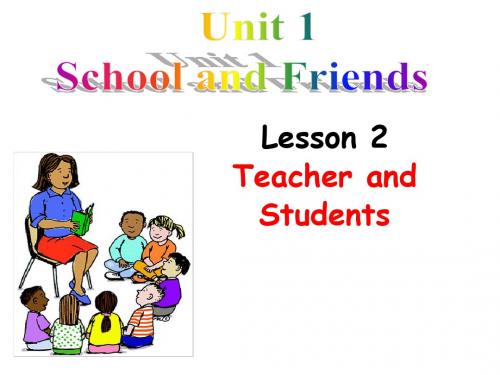
This is my friend. His name is Tony. He is a student. He is from the U.S.
This is my friend. Her name is Betty. She is a student. She is from the Canada.
Da【nn注y:意Is 】she a student? Je1n.n人y: 称Ye代s. 词She的’s主ou格r c在las句sm中at作e. 主语。
2.形容词性物主代词在句中作定语。
Fill in the blanks.
A: Jenny, w__h_o_’s_ the man _o_v_e_r _t_h_e_r_e? B: He’s Mr. Jones — _o_u_r _h_o_m_e_r_o_o_m_ teacher. A: And who’s _t_h_e _g_ir_l with Mr. Jones? What’s _h_e_r _n_a_m_e_? B: Her name is Kate. A: Is she a _s_tu_d__en__t ? B: Yes. She’s _o_u_r_c_la_s_s_m__a_te_.
A: Good morning, Wang Mei. B: _G_o_o_d_m__o_r_n_in__g, Li Ming. A: Wang Mei, _t_h_is_i_s my friend. _H__isname is Yang Hao. He’s _i_n Class _F_o_u_r. B: _N_i_ce_ t_o_m__e_et_y_o_u_, Yang Hao. C: Nice to meet you, too. B: This is _m_y_f_r_ie_n_d_, Li Lin. She’s in Class _F_iv_e_. C: Nice _to_ meet you, Li Lin. D: Nice to m__e_e_t you, t_o_o_.
- 1、下载文档前请自行甄别文档内容的完整性,平台不提供额外的编辑、内容补充、找答案等附加服务。
- 2、"仅部分预览"的文档,不可在线预览部分如存在完整性等问题,可反馈申请退款(可完整预览的文档不适用该条件!)。
- 3、如文档侵犯您的权益,请联系客服反馈,我们会尽快为您处理(人工客服工作时间:9:00-18:30)。
Use the phrases from the Function File to prepare some advice for a foreign visitor who is invited to a celebration in China.
a) a birthday b) a local or national festival c) a wedding
2. Nowadays you ____________ be too don’t have to formal. 3. You _________ arrive late to a dinner shouldn’t party. 4. You _______ take something with you. should 5. You _________ drink too much at parties. shouldn’t 6. And you _________ accept a lift home shouldn’t from a person you don’t know. 7. You ______ be careful. must
Speaking
Work in pairs. Student A is a foreign visitor who is invited to a celebration in Student B’s country . Student B gives advice. With the help of Function File in exercise4, ask and answer questions about the following things: clothes to wear(male/female), presents to take, time to arrive/leave, things to say, tings not to do
Complete the following sentences with suitable words:
1.We only invited family and ____________ close friends to my father’s birthday party. My father made a really funny speech about life ______ starting at sixty-five, and he thanked everyone for bring him a ________. present 2. In the summer, we love having a __________ in the garden with friends. barbecue
Listen to the cassette again and do the exercise
1. When you are invited to a party in the UK , you _________ A. you needn’t take anything. B. Do as you are in China C. You can take small gifts, such as a bottle of wine, or chocolates. D. You can’t take flowers except at wedding
New Year party
rty
birthday party
different parties
• anniversary; 周年纪念日 • birthday; • graduation; • a wedding reception; • retirement; 退休 • a farewell party; 欢送会 • a house warming 乔迁聚会 party; • a sporting victory;
Listen and decide why each person is celebrating:
passing his / her driving test retiring going to study abroad getting a job with good salary
1. 2. 3. 4.
2. Which of the following state is not true? A. You should wear a tie at weddings. B. You’d better not take the car driven by a stranger. C. You’d better arrive at the party earlier to help the host. D. Teenagers may drink a little.
Try to complete the sentences about what you should and shouldn’t do at parties in Britain. Then listen and check your answers.
don’t have to, should (x 2), shouldn’t (x 3), must Giving advice 1. If it’s very formal, you ________dress should smartly.
3. At the wedding ___________, we had reception a _______________ in a big sit-down meal restaurant --- there were about twenty people at each table. 4. At our parties, there isn’t any ________ to drink, only __________ alcohol soft drinks and there are lots of ________ like snacks biscuits and sandwiches to eat.
Example A:I’m going to a wedding this weekend. What should I wear?
B:You should wear formal clothes – a jacket and tie. C:What should I take?
Listen to learn
Listening Strategies: Understanding the general idea •Don’t worry if you can’t understand everything. •Listen for important words and phrases. (e.g. failed twice, interview) •Try to link key words to topics. •Listen more than once, if possible.
